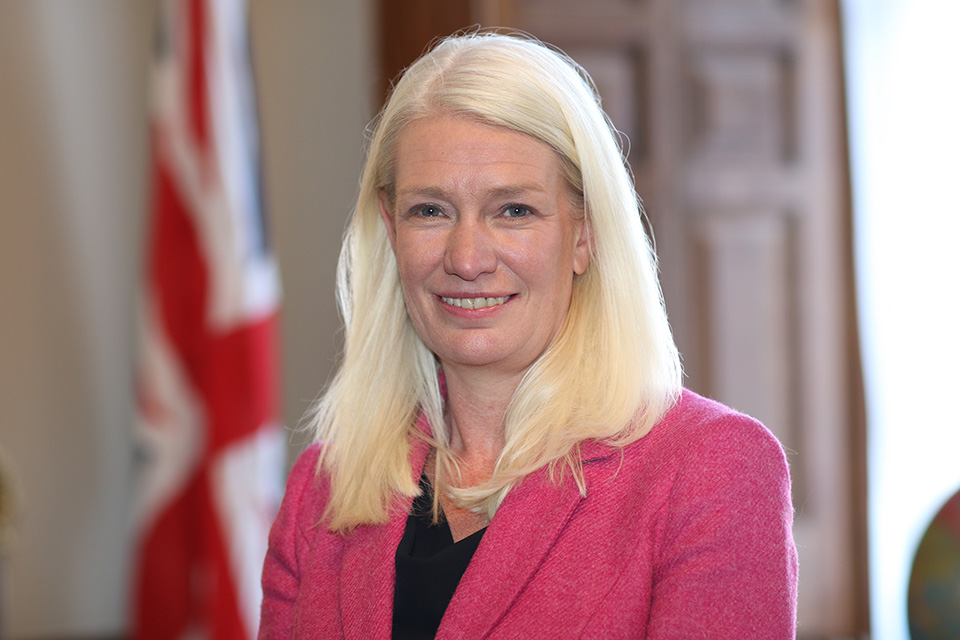UNCTAD15: UK statement during the general debate
Amanda Milling, FCDO Minister of State, delivered the UK statement during the general debate at the fifteenth session of the United Nations Conference on Trade and Development (UNCTAD15).

Ladies and gentlemen, I am delighted to speak on behalf of the United Kingdom today.
Let me begin by offering my warmest congratulations to Secretary-General Rebeca Grynspan on her appointment. The UK looks forward to working together on revitalizing and reforming UNCTAD, its mandate and its impact to the world, as per her vision.
The fact that we are meeting virtually is testament to the agility and adaptability that UNCTAD and the international community have shown in response to the pandemic.
We will need all those skills for the difficult task ahead. The task of rebuilding and emerging from this crisis more resilient, more inclusive and more environmentally sustainable.
UNCTAD has an important part to play.
As the leading trade and development organisation, it is well-placed to bring together state, private and charitable sector experts, to explore new routes for successful COVID-19 recovery.
The route we need is one that puts us back on track with the Sustainable Development Goals, and the commitments set out in the Addis Ababa and Paris Agreements.
As we enter the Decade of Action, it is crucial that we focus on reducing vulnerability and dependence, while increasing our climate, disaster, and economic resilience.
This conference is an excellent opportunity to reinforce our commitment to working collectively on these issues, and to making tangible progress towards achieving Agenda 2030.
Ladies and gentlemen, this is the first time the UK is representing itself independently at this conference in nearly 50 years, so I would like to reaffirm our steadfast commitment to supporting developing countries to reduce poverty through trading opportunities.
We are proud to be one of the major aid donors.
Our comprehensive Aid for Trade portfolio continues to support our partners to break down barriers to trade.
The UK is now in a unique position where we can, and will, shape our independent trade and development work to best support our partners.
For example, earlier this year, we launched our own Developing Countries Trading Scheme, which grants duty-free, quota-free access to 46 Least Developed Countries, and special tariff reductions to other developing countries.
We are looking to improve that further, by lowering tariffs and simplifying rules of origin requirements. We aim to be a global leader in trade preferences.
Beyond that, we have eight development-focused free trade agreements with African, Caribbean and Pacific countries that put our relationships on a more equitable and mature footing.
In 2020, the UK imported more than £30 billion in goods and services from developing and least developed countries with preferential trading arrangements, supporting their growth and poverty reduction.
We are proud to say that our trade agreement with Australia will be the first ever Free Trade Agreement between two advanced economies to include a chapter dedicated to development issues.
We will continue to use our presidency of the G7 and COP26 this year to push for meaningful progress towards a more sustainable and environmentally conscious world.
We want to reduce vulnerabilities so that our planet and people can prosper.
UNCTAD 15, alongside COP26 and MC12, is a vital moment for the international community to come together and address climate change, environmental degradation and biodiversity loss. Our focus needs to be on reducing economy-wide emissions and supporting developing countries to mitigate and adapt to the impacts of climate change.
Madam President, the UK views UNCTAD as an important vehicle for monitoring, analysing and progressing the trade and development agenda.
UNCTAD is already delivering brilliant work to support countries to Agenda 2030, through the UK-funded Sustainable Manufacturing and Pollution programme.
That programme helps developing countries reduce environmental pollution associated with industrial process.
We also work together on the Capacity Building Programme, which supports developing and least developed countries to implement the WTO Trade Facilitation Agreement.
UNCTAD should continue to focus on its comparative advantage as an expert in producing objective, high-quality research and analysis. This work helps target our technical assistance for the best results on the ground.
Within the uncertain funding landscape, it is crucial that UNCTAD focuses available resources on its priority areas and does not overburden itself.
Strong institutional governance, inter-divisional cooperation and focus on consensus-building will be vital to delivering the new mandate over the next four years.
To conclude, the United Kingdom is fully committed to a positive outcome at UNCTAD 15. An outcome based on partnership for a fairer, more prosperous and equal world.
Our focus remains on inclusive, open economies under the rules-based international trading system and a greener, more sustainable future for us all.
I wish Barbados every success for its presidency of UNCTAD 15.
Thank you.